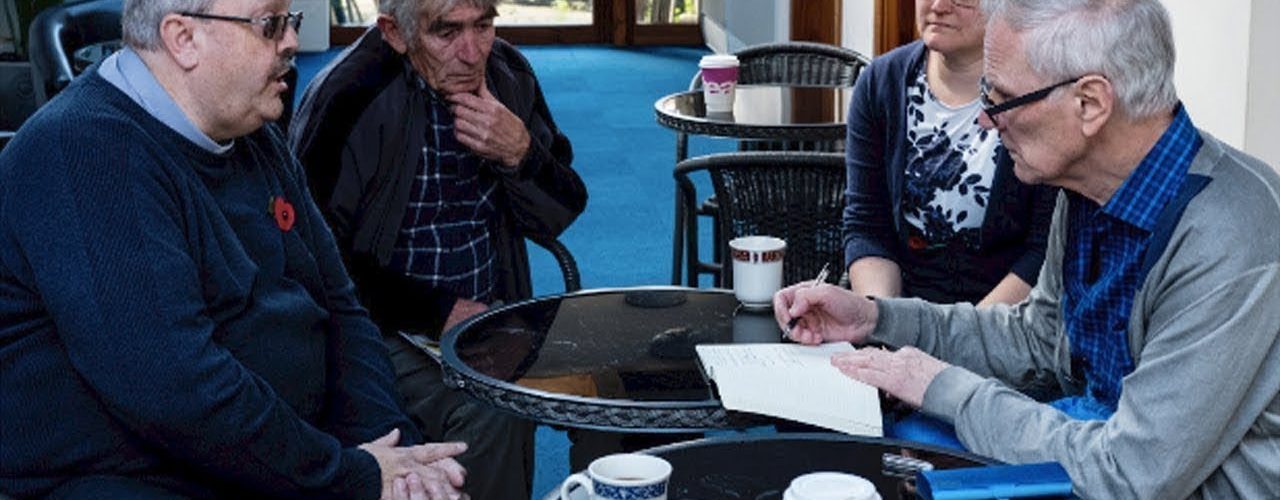Poverty and destitution in the UK, even among those employed, and harsh government policy ‘solutions’ like punitive ‘job centers’ hit the most vulnerable hardest, including women and people with disabilities, explains UN Special Rapporteur, Philip Alston discussing his investigation into UK poverty.
December 22, 2018 Produced by Lynn Fries
TRANSCRIPT
LYNN FRIES: It’s The Real News. I’m Lynn Fries. Independent human rights expert Philip Alston has been designated by the United Nations Human Rights Council to monitor and advise on extreme poverty and its intersection with Human Rights. Philip Alston has a mandate to visit and investigate countries with high levels of deprivation and then report those findings to the United Nations. Recently, Philip Alston released his preliminary findings of his visit to the UK to investigate poverty in the United Kingdom. In June, he’ll present a full report to the UN Human Rights Council. Why would Philip Alston, as United Nations special rapporteur on extreme poverty, want to visit the United Kingdom, one of the richest countries in the world and fifth largest economy?
Here to talk to us about his work as special rapporteur and specifically his investigation of poverty in the United Kingdom is Philip Alston. Our guest joins us from New York, where he’s a Professor of Law at NYU. Philip Alston, welcome.
PHILIP ALSTON: Thank you.
LYNN FRIES: First I’d like to ask you to talk about the main thrust of your report into poverty in the United Kingdom.
PHILIP ALSTON: As you say, it’s the fifth largest economy in the world. It’s a country that currently has record levels of employment, where the economy is actually doing very well. What I discovered is that there are some very significant number of people living in poverty, according to the statistics that are generally accepted by the government, one person in five. And there’s a very detailed analysis by the Joseph Trust which documents one and a half million people living in a state of destitution. In addition to that, what I found is that the cuts that have been introduced under the rubric of austerity have really made a huge difference to the way in which Britons generally are living. Their community life has been pretty dramatically impoverished over the last eight years.
LYNN FRIES: Give viewers some context on a Tweet you posted, saying that “The UK gov’t has a set of talking points about poverty & employment that 1) don’t address poverty 2) use carefully chosen & misleading statistics to paint a rosy picture 3) ignore the horrible situation in which a large number of Britons live. That’s not the way to find solutions.”
PHILIP ALSTON: Well, the government doesn’t focus on the question of poverty. The government keeps repeating the fact that there are now more people in employment than there were in 2010, which is not difficult to predict given that there’s full employment now and in 2010 was the aftermath of the Great Recession, so things were in a particularly bad state. They believe that full employment equals no poverty. So if the great majority of people are out at work, then there shouldn’t be any poverty. The problem is not only the statistics, which as I said are the government’s own statistics, but also those of all of the most trusted think tanks and expert bodies, but the stories that one hears from people around the country who are experiencing great pain, who are having considerable difficulties living on the wages that they’re receiving and the level of benefits that are now available from the government. So they really are feeling the pain and it’s a very different picture from the one that the government presents.
LYNN FRIES: Comment also on this related Tweet, which you said “The #UK government can’t keep touting employment statistics as an answer to #poverty when 60% of those in poverty are in working families and 2.8 million people are in poverty in families where all adults work full time.”
PHILIP ALSTON: Yes. So the problem is that one can be in employment but still earning very low wages. Again, more recent studies show that a very significant number of people who are in employment are earning below what the UK calls the living wage, in other words, the minimum amount that would be needed to live decently. So many of the sort of jobs that are being created provide almost no benefits, provide very low wages and are quite unstable.
LYNN FRIES: In your report, you contrast your findings of a major UK government disconnect in recognizing poverty as a serious problem in the United Kingdom with findings, on the other hand, that UK think tanks, media, independent bodies, even UK parliamentary committees and a broad range of trusted sources do recognize poverty as a major problem in the UK. So tell us about how you go about your fact-finding mission.
PHILIP ALSTON: Well, the way in which I prepare for a mission of this sort is to conduct hundreds of interviews in advance by telephone or by Skype or whatever. I read all of the available reports and the UK is a particularly rich country in terms of the range of academics, the range of civil society groups that really are studying poverty very carefully. As you mentioned, the parliamentary committee system is very productive in the UK in a way that I haven’t seen in any other country, I suppose. They study these issues. They produce regular reports from both Houses of Parliament. The National Audit Office is independent and it produces very high quality economic analyses of social and other issues. So there is a very wide range of government and nongovernment literature out there documenting exactly what the situation is.
The bizarre thing, and this is what I said in my report when I talked about the disconnect, is that almost no one that I spoke to, and almost no one that I’ve seen, thinks that poverty is not a significant issue in the United Kingdom. And I met with the Scottish Government, I met with the First Minister, Nicola Sturgeon, I met with the governments in Wales and in Northern Ireland. They all talked very openly about the significant and quite severe problems with poverty. But what you have in Westminster is a government that is focused on Brexit, on the economy and on full employment, and they don’t actually address the issue of poverty.
So it’s not surprising that over the last couple of weeks, the Prime Minister, Theresa May, has been asked questions by the leader of the Opposition, Jeremy Corbyn, in Parliament in relation to the report that I presented. He has asked her what her response is to those findings and he has cited a number of them. And each time, the Prime Minister has responded by saying the economy is doing great and we’ve got full employment and that’s it. So it’s really answering a completely different question. It’s the equivalent of someone rushing in and saying there are a couple of people dying in the street, and my response is, yes, but everyone who’s here in the house is very healthy. And of course, both of those statements are true but the government doesn’t turn its attention to the people who are out in the street.
LYNN FRIES: What do you think explains that kind of response from the Conservative Party as you just described it? Sum up on what essentially underlies this disconnect.
PHILIP ALSTON: Well, the essential element, and this is now common to conservative parties in many parts of the world, is that employment is better than welfare. And of course, that’s absolutely true. Anyone who is out of a job is very keen to get one. I met almost no one in Britain who was avoiding work. The poor are desperate to get a job and a job that pays enough to live on. But the point is that employment alone is not sufficient. Individuals exist within a context, the family, the community, they have a range of needs, they may be related to mental health, they may be related to physical health, may be related to care for the elderly, care for children, they may have breakdowns, they may have divorces, whatever. There are things in people’s lives that lead to the need for forms of assistance from a government and it’s that broader safety which is being very consistently chipped away at in the United Kingdom context.
LYNN FRIES: And give us some examples of ways in which this philosophy that employment is better than welfare is playing out under the Conservative government’s new benefit system known as Universal Credit.
PHILIP ALSTON: What you’ve got is the introduction of job centers where people are under great pressure. Each so-called “work coach” who supervises a significant number of people who are on benefits is really required to deal with a lot of people each day. So the amount of time that is available for any particular person is quite limited. The punishments that are handed out by the work coaches for even very minor infractions are very severe. The sort of documentation that is constantly required, it’s all now done online. There are a few minor exceptions, but the government is trying to make sure that everybody does this online, including uploading documents and so on. Then of course, there are many people who are unemployed who have never worked in offices and really barely used computers. And so, that again makes it all very difficult for them.
I think what’s been put in place is a series of obstacle courses. The figures show that something like a third of people who start filling out the applications for Universal Credit don’t complete it. The government doesn’t have any detailed explanation for that, but certainly people I spoke to said it’s all so demanding, it’s tough and people just find themselves unable to cope so they don’t do it.
LYNN FRIES: You report that the highest toll in all this falls on those least able to bear it. Give us an example from your findings.
PHILIP ALSTON: The group that was really most vocal in speaking with me are people with disabilities. Now, that’s a pretty large group, people who have a disability of one kind or another. They point to the fact that many of them, probably most I would say, are in the process of being “reassessed.” Now, that reassessment means that they have to go in, they meet with a person who is not a trained medico, but just a consultant employed by an outside group, who then–in their telling to me–asked them to do a number of things. “Can you put your hand on your head, can you pick up a pencil, would you be comfortable talking to a stranger in the street?” And when the answers to all those questions are positive, the outcome is that the assessor says, “You know what? You’re able to work, so we’re going to take away your disability assessment and you should simply go out and get a job.”
And the people who told me that, many of them, many cases presented to me, had detailed documentation from their specialists, from doctors and others, detailing what they were not able to do and why they weren’t able to do many types of a job. But that’s simply being overlooked and these people are now under great pressure to get out into the workforce and perform like anyone else. Women who are in single families and who have children, they too find that there are no concessions made to the fact that they’re balancing all sorts of other obligations. They still have to turn up very regularly at the job center to be reporting in, to be putting in 35 hours job searching and so on, despite all of the other pressures on their lives. So I think there are quite a few different groups that are negatively affected by all of this and they are, of course, the low income groups.
LYNN FRIES: You report a gender dimension in your findings on how the highest toll on this falls on those least able to bear it. Tell us about that.
PHILIP ALSTON: One of the issues that came up very often is that this so-called Universal Credit, the single benefit that is now payable to people who are on welfare, is first of all, not provided until at least five weeks after the assessment has been successfully made. In other words, you are approved to receive the benefits, you are then told that you will get your first payment in five weeks from that moment, although many people experienced a wait of up to twelve weeks or more. During that period, they have nothing to live on, and that really is particularly cruel and harsh. But another element that’s related to it, and that affects women in particular, is that Universal Credit now brings together all of the benefits for a single household and the payment is made to one person only in that household. The person who gets it, overwhelmingly, is the male.
And so, many women suddenly feel much more vulnerable, because all of the income is going to the male in the household and not to them. They feel that this increases rates of family violence. It puts them very much at the mercy of the male in the household and so on. They have requested that the government agree to make separate payments, but the government has refused. Its claim is that this would be too expensive, but it hasn’t produced any figures to back that up. And since the whole system is very highly automated, it would be surprising if they were not able to make that adjustment at a reasonable cost.
LYNN FRIES: We’re going to break and be back with our guest for part two of this conversation with United Nations special rapporteur on extreme poverty and Human Rights, Philip Alston. Philip Alston, thank you.
PHILIP ALSTON: Thanks, Lynn.
LYNN FRIES: And thank you for joining us on The Real News Network.
END TRANSCRIPT
Philip G. Alston is an international law scholar and human rights practitioner. He is John Norton Pomeroy Professor of Law at New York University School of Law, and Chair of the law school’s Center for Human Rights and Global Justice. Philip Alston is the United Nations Special Rapporteur on Extreme Poverty and Human Rights (2014-2020).
Originally published at TRNN



